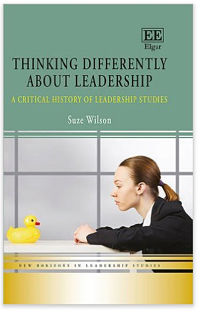Thinking differently about leadership: A critical history of leadership studies. (2016)

“…when leaders buy in to the concept that they can bring about massive change and transformation, it can lead to arrogance and narcissism.”
Suze Wilson, Massey University New Zealand.
Edward Elgar Publishing
From a preview: “It’s time for business to move away from an obsession with charismatic, transformational leaders and look for people who have a long-term, sustainable focus for organisations, … the focus on bold visionary leaders that has existed for the past 30 years is problematic for employees, companies and the leaders themselves. It relies on the assumption that there’s a problem with most people and they require a visionary leader to fix them.
“…when leaders begin to ‘buy in’ to the concept that they are able to bring about massive change and transformation it can lead to arrogance and narcissism.
“The bold and heroic leadership traits that frame the concept of a charismatic, transformational leader are traditionally seen as more masculine than feminine, which doesn’t help the movement for equal numbers of men and women in business leadership roles.
“To achieve that, we need to change the mould of leadership to better fit what women can bring, not make women fit a masculine mould.”
From the publisher’s website: “.. asks why and how we have come to understand leadership in the way we now do, and the consequences that arise from these understandings …reveals troubling assumptions and problematic expectations for leaders and followers, which are key features of leadership theorizing both in the past and present day…
“Arguing that conventional understandings of leadership today are deeply problematic, the book examines why we ought to think differently about leadership and offers an approach for doing so.”
Access the book here: Thinking differently about leadership
Read the preview here: Charisma in bosses can be a problem






Leave a comment
Back to the top